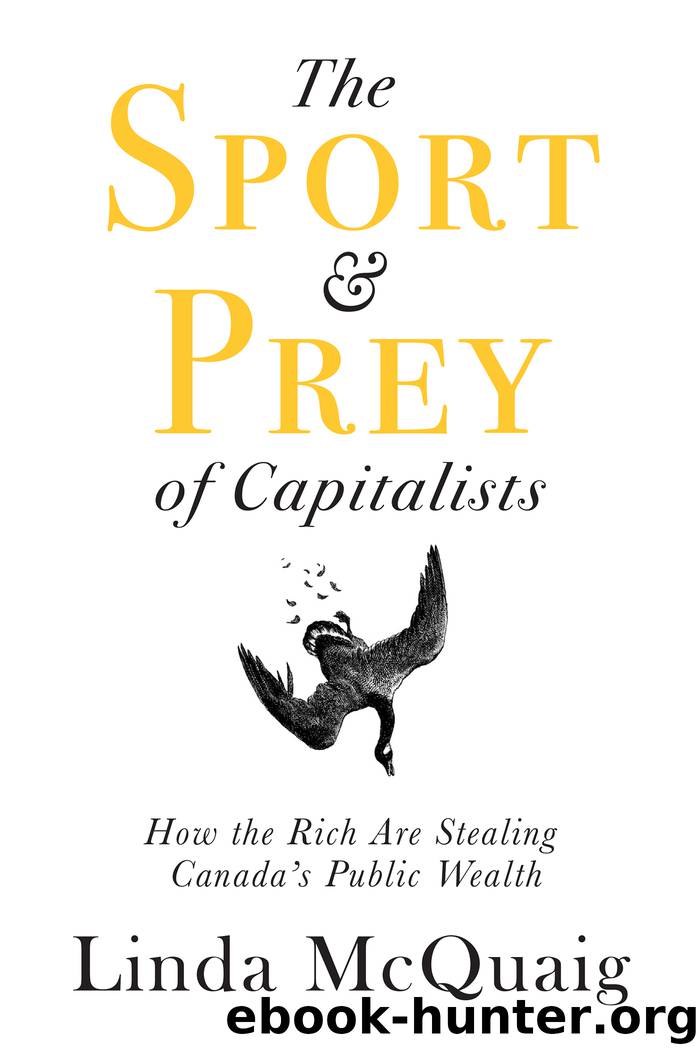The Sport and Prey of Capitalists by Linda Mcquaig

Author:Linda Mcquaig
Language: eng
Format: epub
Publisher: Dundurn
Published: 2019-08-30T16:00:00+00:00
In the decades since Adam Beck presided over Ontario Hydro, many big mistakes have been made. Perhaps the biggest mistake — the one that arguably led to so many others — was the decision not to copy the successful Hydro model and create a similar publicly owned system for natural gas.
By the early years after the Second World War, Hydro’s transmission lines had brought electricity to every corner of the province. But while electricity was a superb power source for lighting and for small motorized functions, it was not nearly as efficient as natural gas in providing heat, something clearly essential in the Canadian cold. With natural gas abundant in Alberta, there was growing interest in the 1950s in the idea of building a pipeline to bring western gas to Ontario and Quebec. And, given Hydro’s popularity, many Ontarians saw merit in making it a publicly owned, non-profit pipeline and distribution system, which, according to estimates, would reduce the cost of gas to the consumer by 30 to 40 percent.
Conservative premier Leslie Frost weighed the possibility of developing a publicly owned gas system, realizing that this would fit well with his party’s much-lauded creation of Hydro decades earlier. However, there were private interests in the gas business keen on expanding their market. “It was the public versus private power contest all over again,” notes energy analyst and author Bill Reno. “Although this time, the private interests weren’t a huge entrenched force like the earlier private power interests, and Ontarians were already aware that a public system could work very well.”19
But even if the private gas interests weren’t the formidable force the Syndicate had once been, they still had influential friends inside Frost’s Cabinet. Provincial treasurer Dana Porter, for instance, argued that it would be unfair to oblige private oil and gas companies to compete with a publicly owned gas company, which would be able to deliver gas cheaply. With this logic, Porter turned Adam Beck upside down: instead of regarding lower prices resulting from a public system as a benefit to the public, it was seen as an injustice to private interests.
In the Ontario legislature, the CCF — forerunner of the NDP — strongly pushed for a public gas system, but in the end the Conservative Cabinet decided to hand the lucrative gas distribution business over to private companies. “Half a century after private power monopolies were dismantled by popular vote, here was a Conservative government creating new private power monopolies — without holding any votes,” said Reno in an interview.
Meanwhile, in Ottawa, the Liberal government of Louis St. Laurent was taking steps to ensure that the pipeline delivering the gas would also be in private hands. C.D. Howe, the federal minister of trade and commerce, went to Texas and negotiated a deal with powerful U.S. oil interests who, along with some minor Canadian partners, had formed a consortium called TransCanada Pipelines (TCPL). When TCPL was unable to raise all of the $375 million needed to finance the 925-kilometre pipeline, the consortium asked Ottawa to guarantee its debentures.
Download
This site does not store any files on its server. We only index and link to content provided by other sites. Please contact the content providers to delete copyright contents if any and email us, we'll remove relevant links or contents immediately.
| Arms Control | Diplomacy |
| Security | Trades & Tariffs |
| Treaties | African |
| Asian | Australian & Oceanian |
| Canadian | Caribbean & Latin American |
| European | Middle Eastern |
| Russian & Former Soviet Union |
The Secret History by Donna Tartt(18977)
The Social Justice Warrior Handbook by Lisa De Pasquale(12172)
Thirteen Reasons Why by Jay Asher(8861)
This Is How You Lose Her by Junot Diaz(6849)
Weapons of Math Destruction by Cathy O'Neil(6234)
Zero to One by Peter Thiel(5749)
Beartown by Fredrik Backman(5696)
The Myth of the Strong Leader by Archie Brown(5477)
The Fire Next Time by James Baldwin(5399)
How Democracies Die by Steven Levitsky & Daniel Ziblatt(5186)
Promise Me, Dad by Joe Biden(5122)
Stone's Rules by Roger Stone(5060)
A Higher Loyalty: Truth, Lies, and Leadership by James Comey(4927)
100 Deadly Skills by Clint Emerson(4891)
Rise and Kill First by Ronen Bergman(4749)
Secrecy World by Jake Bernstein(4714)
The David Icke Guide to the Global Conspiracy (and how to end it) by David Icke(4667)
The Farm by Tom Rob Smith(4479)
The Doomsday Machine by Daniel Ellsberg(4464)
